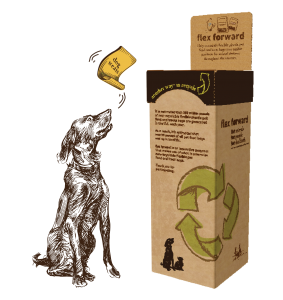
Nova announces two new collaborations to boost PCR use in plastics packaging
Canadian Plastics
Canadian Plastics RecyclingCalgary-based Nova is partnering with recycler Revolution to provide a portfolio of PCR-based resins, and is also sponsoring the Pet Sustainability Coalition’s FlexForward pilot recycling program.
Nova Chemicals Corp. has entered into two new collaborations designed to increase the use of post-consumer recyclate (PCR) in flexible packaging.
In the first, Calgary-based Nova is partnering with recycler Revolution to provide a portfolio of PCR-based resins to Nova’s customers that will be available as soon as next month to help converters and brand owners achieve their sustainability goals; and in the second, Nova is sponsoring the Pet Sustainability Coalition’s FlexForward pilot recycling program, to advance the circular economy for flexible plastic pet food and treat packaging materials.
Nova’s partnership with Revolution builds on the one Nova recently made with Merlin Plastics to increase the supply of post-consumer recyclate (PCR) available for consumer packaging. Revolution manufactures plastic films for a variety of consumer and industrial products and packaging, which they recapture after use to recycle and reuse in new products. This agreement will utilize a portion of this “closed-loop” plastic, and Nova will begin to provide these resins in January 2021. “The relationship we’ve built with Revolution will have a significant impact on the market for recycled plastics,” said Greg DeKunder, Nova’s vice president, polyethylene marketing. “Joining forces enables Nova to be a one-stop shop for our customers’ PCR needs”.
As part of its involvement with the Pet Sustainability Coalition’s FlexForward program, Nova will become the technical sponsor of “Toward Circularity”, which is an expansion of that program. To help address some of the biggest obstacles to achieving packaging sustainability, “Toward Circularity” will expand collection to include both post-consumer and post-industrial recycled (PCR and PIR) material, and conduct testing to determine best markets and applications for the recyclate. “Toward Circularity” has two objectives: first, to decrease the current landfill rate of 99 per cent of plastic pet food and treat bags by finding uses for recycled plastic pet food and treat bags; and second, to provide end-of-life solutions for consumers, retailers, and packaging manufacturers.

Image Credit: Nova Chemicals Corp.
In August 2020, the Pet Sustainability Coalition, in partnership with pet food brand Earth Animal and distributor Pet Food Experts, launched the Flex Forward pilot program to test a ‘return to retail’ pet food packaging collection system where the packaging is recycled for use in new products. More than 10,000 used pet food bags have been collected at 120 return-to-retail collection points in independent pet food retail locations in Oregon and Washington to date. As the current post-consumer packaging pilot comes to a close, the “Toward Circularity” expansion will increase testing of the collected materials from consumers to find ways to introduce the recycled pellets into new materials, while also collecting and testing scrap that occurs from misprints and manufacturing errors. Nova will conduct testing on the collected recyclate at its Centre for Performance Applications in Calgary; test results will help the Pet Sustainability Coalition better understand the use, applications and performance attributes and further refine their understanding of how to best repurpose the material. “Ultimately, the learnings from the pilot are intended to inform and shape a pet industry wide closed-loop plastics recycling program whereby pet owners, retailers, brands, and packaging suppliers can collaborate to reduce the environmental footprint of packaging,” Nova officials said.
“Only six percent of all plastics that are recycled today are flexible materials,” added Monika Kleczek, Nova’s circular economy market manager. “The Flex Forward pilot is a great opportunity to tap more of the potential for flexible films to be recycled into new, valuable products.”
